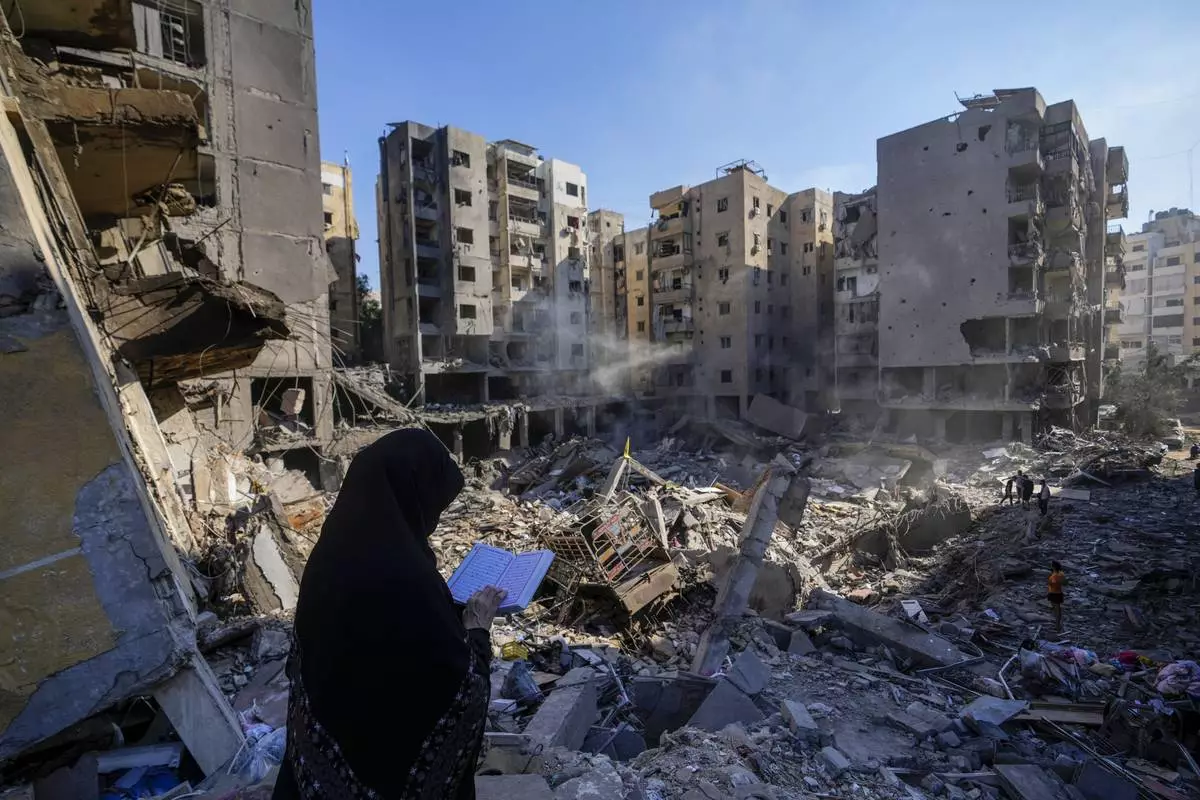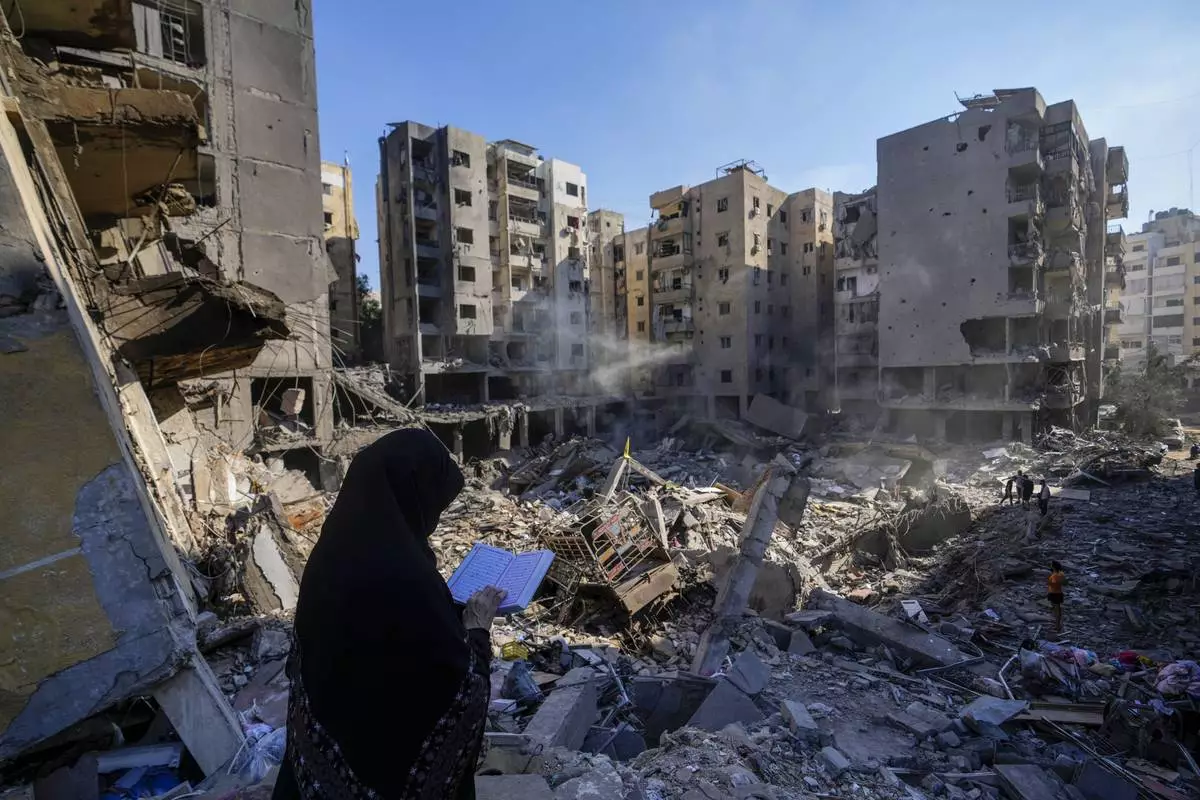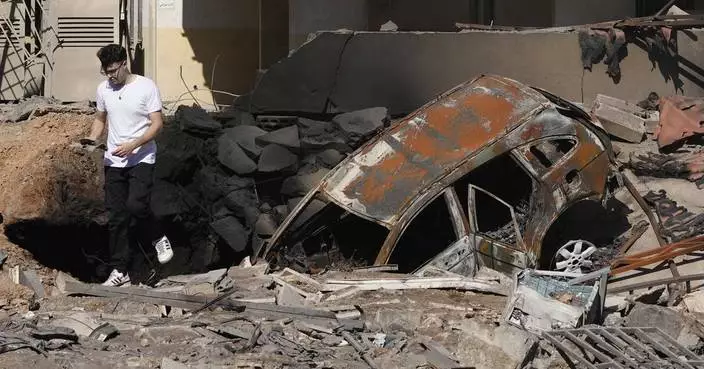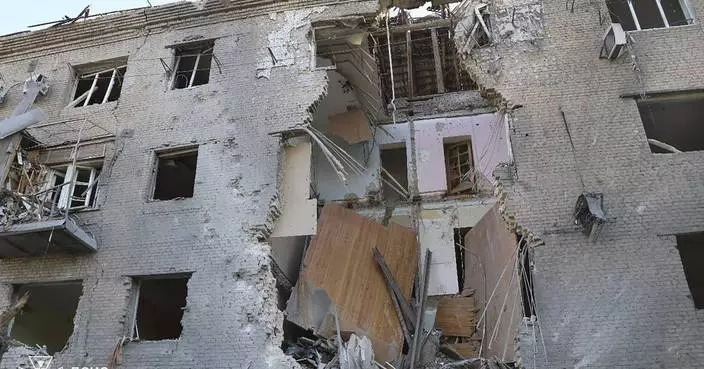WASHINGTON (AP) — Tim Walz and JD Vance might have the chance to reshape the political landscape Tuesday in their first and only debate.
Vice presidential picks have traditionally taken on the role of political attack dog, laying into opponents so that their running mate can appear above the political fray. That's generally been less true since former President Donald Trump scrambled political norms.
But Walz, the Democratic governor of Minnesota, made it to national prominence by labeling rival Republicans “weird.” Vance, the Republican junior senator from Ohio, has torn into Vice President Kamala Harris ' party on immigration, notably by spreading a false story about Haitian immigrants in his home state that Trump then cited during his own debate with Harris.
Here's a look at past vice presidential debates — and the larger role of the office Walz and Vance are both seeking.
The vice president presides over the Senate and is empowered to break ties, as Harris has done a record 33 times. She exceeded the previous high mark last year, which had held since John C. Calhoun was vice president from 1825 to 1832. The officeholder also presides ceremonially in Congress over the certification of electoral results, which Vice President Mike Pence did even after a mob of Trump supporters stormed the U.S. Capitol on Jan. 6, 2021, in a bid to halt the process and transition of power, with some chanting, “Hang Mike Pence!”
But the vice president's main job is to be ready to take over if something happens to the president. Nine have done so following a president’s death or departure from office — the last being Gerald Ford, who became president when Richard Nixon resigned in 1974.
The Constitution’s 25th Amendment, ratified in 1967, spelled out the succession rules, stating that the vice president becomes president “in case of the removal of the president from office or of his death or resignation.” It also allowed the president and Congress to nominate and approve a new vice president if that office is vacated.
Vice presidential historian Joel K. Goldstein said two recent assassination attempts against Trump raise "the saliency of succession.” But he added that many voters view vice presidential nominees as appendages of the candidates who selected them, not necessarily as potential future presidents themselves.
“People do look at somebody as, are they ready to be a heartbeat away?” Goldstein said. “But it is also a question of how good a decisionmaker is the person who chose them.”
In 1992, Adm. James Stockdale, running mate of third-party candidate Ross Perot, was going for breezy but seemed befuddled when he opened the debate by saying, “Who am I? Why am I here?” His later response to a question, “I didn’t have my hearing aid turned up,” only reinforced that perception.
The debate between No. 2s was highly anticipated in 2008 after Republican Arizona Sen. John McCain selected Alaska Gov. Sarah Palin as his running mate and saw a bump in the polls. But her showdown with then-Delaware Sen. Joe Biden is best remembered for Palin approaching him before the start and saying, “Can I call you Joe?” That was Palin attempting to keep from mistakenly calling her opponent “O’Biden,” conflating Biden’s name with that of his running mate, then-Illinois Sen. Barack Obama.
The vice presidential nominee and Texas Democratic senator, Lloyd Bentsen, offered a stinging rejoinder against his opponent, Republican Sen. Dan Quayle of Indiana, in 1988. After Quayle compared himself to John F. Kennedy, Bentsen replied, “You’re no Jack Kennedy, senator.” But it was one of the Democratic ticket's few high points in a race it lost handily.
In 2020, Harris faced off with Republican Vice President Mike Pence and declared when he tried to interrupt her, “I’m speaking,” a line she’s reprised in this campaign. But both candidates might have been overshadowed by a fly that perched on Pence's hair for what felt like an eternity.
A nominee’s choice of No. 2 has historically made little Election Day difference. This year could be different.
Historical analysis by Mark P. Jones, a political science professor at Rice University in Houston, suggests that voters aren’t really swayed by a candidate’s running mate. Even the idea of using a pick to balance a ticket — like pairing the first major party nominee who is a woman of color with a white male in the case of Harris selecting Walz — may also be overstated.
“The evidence we have is that they’re really voting for the presidential nominee,” Jones said of Americans through the decades.
A key caveat might be that, given just how close the current race is looking to be in swing states, “It’s always possible that, at the margins, it may matter,” Jones said.
One reason why the Walz-Vance debate might shift more opinions this year is that Harris and Trump shared a stage only once, in early September. That means Tuesday may be the last chance before Election Day for voters to see the two tickets square off directly.
But, more likely, both Walz and Vance will simply need to avoid memorable unforced errors that can be endlessly replayed. Jones said such a race-shifting gaffe is unlikely — but not impossible.
“They’re disciplined,” Jones said. “But all it takes is one.”

This combination of photos shows Democratic vice presidential candidate Minnesota Gov. Tim Walz, left, at the DNC on Aug. 21, 2024, in Chicago, and Republican vice presidential nominee Sen. JD Vance, R-Ohio, on Sept. 25, 2024, in Traverse City, Mich. (AP Photo)

This combination of photos shows Republican vice presidential nominee Sen. JD Vance, R-Ohio, left, on Aug. 6, 2024, in Philadelphia, and Democratic vice presidential candidate Minnesota Gov. Tim Walz, Aug. 9, 2024, in Glendale, Ariz. (AP Photo)
The Israeli military said Sunday it killed Nabil Kaouk, another high-ranking Hezbollah official, a day after the Lebanese militant group confirmed the death of multiple commanders, including longtime leader Hassan Nasrallah.
This also came hours after an Israeli airstrike on northeast Lebanon killed 11 people. Israel says it's carrying out attacks on Hezbollah targets in Lebanon.
Meanwhile, the number of those displaced by the conflict from southern Lebanon has more than doubled and now stands at more than 211,000, according to the United Nations.
Hezbollah and Israel have traded near-daily strikes since the Israel-Hama s war started after the Palestinian militant group stormed into Israel on Oct. 7, sparking fears of regional war.
Here is the latest:
BEIRUT — Hezbollah has confirmed the death of a senior commander in charge of its southern front.
The Lebanese militant group says Ali Karaki was killed in an intense Israeli airstrike on Friday that also killed the group’s leader, Hassan Nasrallah, in Beirut.
It says Karaki was responsible for all of Hezbollah’s units in southern Lebanon in the ongoing conflict with Israel.
He is among a handful of senior officials in the militant group killed in Israeli strikes in Lebanon in recent days.
The Israeli military said Sunday that it killed another high-ranking Hezbollah official, Nabil Kaouk, in an airstrike on Saturday.
BEIRUT — The World Food Program says it has launched an emergency operation to provide food to up to 1 million people displaced by violence in Lebanon.
The U.N. agency said Sunday it distributes ready-to-eat food rations, bread, hot meals and food parcels to families in shelters across the country.
The agency says it needs $105 million to help it continue the work until the end of the year and has urged the international community to support the humanitarian response.
Corinne Fleischer, the agency’s regional director for the Middle East, North Africa, and Eastern Europe, said: “Lebanon is at a breaking point and cannot endure another war.”
Lebanese Environment Minister Nasser Yassin said the government estimates that about 250,000 people are in shelters while four times as many may be displaced outside the shelters.
TEHRAN, Iran — Iran’s foreign minister, Abbas Araghchi, said the “horrific” killing of General Abbas Nilforushan wouldn’t “go unanswered,” the foreign ministry’s website reported Sunday.
Nilforushan, a senior officer in Iran’s Revolutionary Guard, was killed in the same Israeli strike on Beirut Friday that targeted Hezbollah leader Hassan Nasrallah.
Araghchi called the killing a “horrible and cowardly act” and vowed to use all political, diplomatic, legal, and international channels to pursue those behind it and their supporters.
Meanwhile, in Tehran, many Iranian officials, including Mohammad Javad Zarif, the former Iranian foreign minister and the current vice president for Strategic Affairs, and Gen. Esmail Qaani, the commander of Quds Forces, the foreign wing of the Islamic Revolutionary Guard, paid their condolences for Nasrallah’s death at the Hezbollah office in the Iranian capital.
JERUSALEM — The Israeli military says it has uncovered and dismantled a Hamas tunnel in central Gaza that was over a kilometer (0.6 miles) long.
It said Sunday that the tunnel ran near residential buildings, and that inside were several rooms and equipment used by militants for prolonged stays.
The military released footage showing the entrance to the tunnel, a long staircase leading down and what appeared to be an iron blast door.
Hamas is believed to have built hundreds of kilometers (miles) of tunnels across Gaza to evade Israeli airstrikes. The militants have also used the tunnels to hold hostages captured in the Oct. 7 attack that triggered the war and to launch ambushes against Israeli forces.
Israel has announced the destruction of several large tunnels throughout the war.
CAIRO – Egypt’s president says its revenues from the Suez Canal have dropped by 60%, or more than $6 billion, in recent months as attacks by Yemen’s Houthi rebels disrupt Red Sea shipping.
President Abdel Fattah el-Sissi spoke during a graduation ceremony Sunday at the Police Academy in Cairo.
“The ongoing developments are very serious and could lead to expanding the conflict’s theater,” he said.
Attacks by the Iran-backed Houthis have led shipping firms to divert traffic around the Red Sea and, by extension, the Suez Canal linking it to the Mediterranean.
The Houthis say they are targeting ships linked to Israel, the United States and Britain in solidarity with the Palestinians in Gaza. However, many of the targeted vessels have no connection to Israel or the war.
The canal is a major source of foreign currency for Egypt’s battered economy.
In July, Adm. Osama Rabie, chairman of the Suez Canal Authority, said the canal’s annual revenues dropped to $7.2 billion from $9.4 billion the year before. He said 20,148 vessels transited through the canal in the fiscal year 2023-24, down from 25,911 the year before.
The Israeli military said it killed Nabil Kaouk, a high-ranking Hezbollah official, in a strike in a southern Beirut suburb on Saturday.
Sunday's announcement came a day after Hezbollah confirmed the killing of leader Hassan Nasrallah. There was no immediate comment from the Lebanese militant group.
Kaouk is the deputy head of Hezbollah’s Central Council. He also served as Hezbollah’s military commander in south Lebanon from 1995 until 2010.
In 2020, the U.S. Treasury sanctioned Kaouk and another member of Hezbollah’s council, Hassan al-Baghdadi.
DEIR AL-BALAH, Gaza Strip — Palestinian officials say Israeli strikes have killed at least four people in the Gaza Strip.
Two people were killed in separate strikes early Sunday in the built-up Nuseirat refugee camp in central Gaza. That’s according to the nearby Awda Hospital, which received the bodies. It said another six people were wounded.
In northern Gaza, first responders recovered two bodies after a strike on a house early Sunday, according to the Civil Defense, which operates under the Hamas-run government.
The Gaza Health Ministry says over 41,000 Palestinians have been killed in the Israel-Hamas war, more than half of them women and children. It does not say how many of those killed were militants. Israel says it has killed over 17,000 fighters, without providing evidence.
The war began when Hamas-led militants stormed into southern Israel on Oct. 7, killing some 1,200 people, mostly civilians, and taking around 250 hostage. Around 100 captives are still being held in Gaza, a third of whom are believed to be dead.
DAMASCUS, Syria — A number of militants were killed and wounded in eastern Syria early Sunday near a strategic border crossing with Iraq in apparent airstrikes, pro-government media and an opposition war monitor reported.
Pan-Arab television network Al-Mayadeen cited unnamed sources saying that at least eight Syrians were killed in the strike by the Bou Kamal crossing in Israeli airstrikes.
It was unclear how they confirmed Israeli jets were behind the strikes.
Meanwhile, Britain-based opposition war monitor the Syrian Observatory for Human Rights said five airstrikes killed at least 15 militants, among them leaders, and wounded at least 20 others. The Observatory said the strikes targeted headquarters and warehouses in the city of Deir al-Zour and surrounding towns.
Pro-government radio station Sham FM said that prior to the blasts heard in Deir al-Zour, explosions were heard at a U.S. military base in northeastern Syria following rocket and drone attacks.
None of the reports could be independently verified.
The U.S. military’s Central Command, which has launched airstrikes on Iranian military personnel and Tehran-backed militant groups in Syria’s eastern Deir al-Zour province, didn’t immediately return a request for comment.
The Israeli military doesn’t usually acknowledge its strike on Syria. However, when it does so, it says it targets Iran-backed militants.
BEIRUT — Hundreds of thousands of people in Lebanon have been displaced from the ongoing conflict between Hezbollah and Israel, a Lebanese cabinet minister spearheading the country’s emergency response said.
Environment Minister Nasser Yassin said the government estimates that about 250,000 people have left their homes and taken refuge in government-run shelters and informal ones. However, he told the Associated Press the total number is about “four times as many directly affected and/or displaced outside the shelters.”
The United Nations said that as of Friday, 211,319 people were forced to relocate, and that was before some intensive Israeli airstrikes over Beirut’s southern suburbs in recent days.
The Lebanese government has converted schools and other facilities into temporary shelters. Still, many are sleeping on the streets or in public squares, as the government and non-governmental organizations try to find them places to stay.
TEHRAN, Iran — Thousands of people have gathered across Iran to protest the killing of Hezbollah leader Hassan Nasrallah in an Israeli airstrike.
State TV aired footage of protests in several major cities on Sunday. At Iran’s parliament, lawmakers chanted “Death to America” and “Death to Israel.”
Iran helped establish Hezbollah in the 1980s and has provided the Lebanese militant group with sophisticated weaponry and training.
The airstrike that killed Nasrallah on Friday also killed Gen. Abbas Nilforushan, a senior officer in Iran’s Revolutionary Guard. The Guard officially confirmed Nilforushan’s death on its website Sunday, after it had been widely reported in state media the day before.
BEIRUT — In its first statement since the recent escalation with Israel and following the killing of Hezbollah leader Hassan Nasrallah, Lebanon's military called for calm among the Lebanese “at this dangerous and delicate stage."
Government officials fear that the country’s deep political divisions at a time of war could rekindle sectarian strife and violence in the small Mediterranean country.
“The Israeli enemy is working to implement its destructive plans and spread division among the Lebanese,” the military said.
Military vehicles have been deployed in different parts of the capital as thousands of displaced people continue moving from the south to Beirut.
BEIRUT — Lebanon’s state news agency says an Israeli airstrike early Sunday on a village in northeast Lebanon destroyed a home, killing 11 people.
Six of the bodies were recovered from under the rubble as the search continued for the remaining five in the village of al-Ain, reported National News Agency.
In southern Lebanon, the Islamic Risala Scout Association said five of its members were killed while performing their duties. It said four of the men killed were from the southern village of Tayr Debba while the fifth was from nearby Kabrikha.
More than 700 people have been killed in Lebanon since Sept. 23 when Israel intensified its airstrikes around the country forcing tens of thousands to flee their homes in south Lebanon, the eastern Bekaa Valley and Beirut’s southern suburb known as Dahiyeh.
AMMAN, Jordan — Jordan’s military says a Grad missile fired from Lebanon fell in an open area without causing casualties or damage.
The missile was likely fired at Israel by Lebanon’s Hezbollah militant group, which has intensified its rocket attacks after its leader, Hassan Nasrallah, was killed in an Israeli airstrike on Friday.
Jordan and Israel, which share borders, signed a peace treaty in 1994. The Western-allied Arab country also helped intercept missiles fired at Israel by Iran in April.
Jordan has been fiercely critical of Israel’s policies toward the Palestinians and has repeatedly called for a cease-fire in Gaza. It has also said it will not allow its territory to become a battlefield as tensions mount between Israel and Iran.
CAIRO — Egypt’s president warned that Israeli military operations in the Palestinian territories and Lebanon are pushing the region to the brink and called for international action.
Abdel Fattah el-Sissi, one of the mediators between Israel and Hamas, called for “an immediate and comprehensive cease-fire” in both Gaza and Lebanon amid an unprecedented escalation between Israel and Hezbollah. His remarks came after Hassan Nasrallah, the leader of Hezbollah, was killed in an Israeli airstrike.
El-Sissi’s comments came in a phone call late Saturday with Lebanese caretaker Prime Minister Najib Mikati, according to a statement from the Egyptian president’s office. He also gave orders to send medical and humanitarian aid to Lebanon immediately.
Along with the United States and Qatar, Egypt has for months spearheaded negotiations between Israel and Hamas to end the war in Gaza. But negotiations have repeatedly stalled amid mounting fear of an all-out war between Israel and Hezbollah, an ally of Hamas. Diplomats see a cease-fire in Gaza as the best way to avert a regional war.

A woman reads the Quran at the site of the assassination of Hezbollah leader Hassan Nasrallah in Beirut's southern suburbs, Sunday, Sept. 29, 2024. (AP Photo/Hassan Ammar)

A woman reads the Quran at the site of the assassination of Hezbollah leader Hassan Nasrallah in Beirut's southern suburbs, Sunday, Sept. 29, 2024. (AP Photo/Hassan Ammar)













